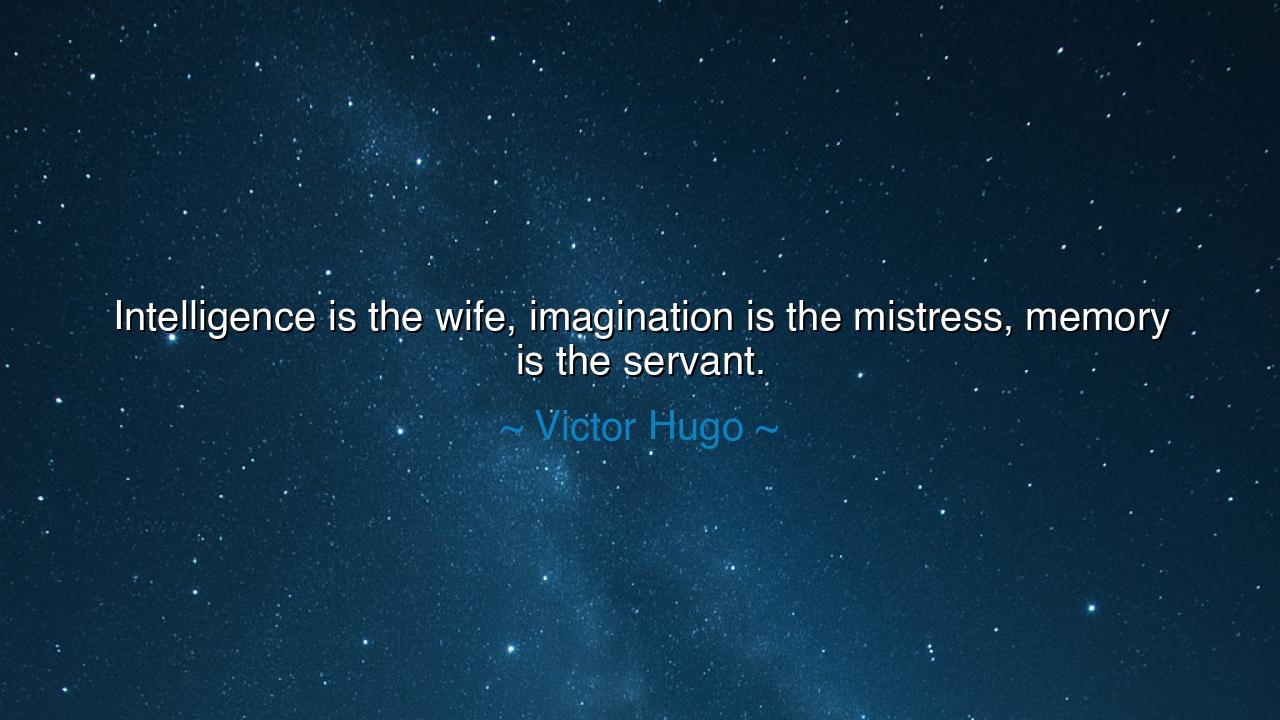
Intelligence is the wife, imagination is the mistress, memory is






When Victor Hugo declared, “Intelligence is the wife, imagination is the mistress, memory is the servant,” he spoke not merely as a poet, but as an architect of the human spirit. In this bold and beautiful metaphor, Hugo unveils the sacred hierarchy of the mind. Each faculty—intelligence, imagination, and memory—has its place, its power, and its danger. Intelligence, the wife, represents order, reason, and constancy—the loyal companion that brings stability to thought and clarity to life. Imagination, the mistress, is passion, unpredictability, and creation itself—the force that seduces the mind to dream beyond what is. And memory, the servant, is the quiet keeper of the past, who fetches for both the wife and the mistress what they require to build or to dream.
The origin of this quote lies in Hugo’s lifelong meditation upon the soul of genius. He, who wrote of revolutions, love, faith, and the storms of conscience, knew well the balance between order and chaos, between discipline and inspiration. For Hugo, the intelligence was the grounding principle of thought—it built systems, laws, and harmony. But the imagination—ah, that was the dangerous and divine spark that broke boundaries, defied rules, and reached for eternity. Yet neither could exist without memory, the humble but essential storehouse of all that had been learned and lived. In these words, Hugo reminds us that the greatness of the human mind lies not in one faculty alone, but in their union—each serving, each tempering the other.
To call intelligence the wife is to praise her fidelity and strength. Like a steadfast partner, she provides structure to the house of thought. She reasons, calculates, and sustains. But she is not always fiery; she is deliberate, patient, and sometimes constrained. Imagination, on the other hand, is the mistress who arrives like a tempest—irresistible, intoxicating, and full of danger. She does not obey reason; she seduces it. She tears down the walls that intelligence builds, not to destroy, but to show what lies beyond. Without her, the soul grows cold; with her alone, it burns to ruin. The memory, silent and obedient, serves them both—providing the material from which intelligence draws its logic and imagination draws its visions. In this triad, memory is the soil, intelligence the structure, and imagination the flame.
History itself testifies to Hugo’s truth. Consider Leonardo da Vinci, who embodied all three in perfect harmony. His intelligence was profound, studying anatomy, mechanics, and geometry with unyielding rigor. His memory was vast, retaining every observation and lesson from the natural world. Yet it was his imagination—his divine mistress—that made him immortal. From her came the designs of flying machines, the enigmas of his paintings, and the visions that centuries could not exhaust. Without intelligence, his art would have lacked form; without imagination, his science would have lacked soul. Leonardo’s genius was the marriage of intellect and passion, with memory as the faithful servant to both.
But Hugo’s metaphor carries warning as well as wonder. He knew that when imagination overtakes intelligence, madness can follow. The mistress, when left unchecked, can lead the mind astray into illusion and folly. And when intelligence suppresses imagination, life becomes sterile—truth without beauty, reason without meaning. Likewise, when memory rebels against her station, clinging too tightly to the past, she imprisons both reason and creativity in nostalgia and fear. Thus, the mind must be governed like a kingdom of balance: the wife ruling with wisdom, the mistress inspiring with passion, and the servant laboring in quiet devotion.
The ancients themselves spoke of this harmony in other forms. Plato saw the soul as a charioteer driving two horses—one noble and one wild—symbolizing reason and desire. Hugo, centuries later, reimagined this eternal struggle within the mind. For to be human is to dwell between the known and the unknown, between order and dream. The wise man does not deny his mistress, nor does he abandon his wife; he honors both, knowing that only together do they complete him. Imagination without intelligence is chaos, and intelligence without imagination is death. Between them flows creation itself.
So, my listener, learn this lesson: nurture your intelligence, but do not let it imprison you; embrace your imagination, but do not let it consume you; and tend to your memory, for she is the servant who keeps your soul’s house in order. Read, learn, and reflect, for that is the work of intelligence. Dream, create, and feel, for that is the dance of imagination. Remember your experiences, your lessons, and your loves, for that is the service of memory. When these three move in harmony, life becomes not just existence, but art.
Thus, as Victor Hugo teaches, the mind is a household of many powers—each vital, each dangerous, each divine. The wife brings reason, the mistress brings wonder, and the servant brings continuity. To live well is to honor them all: to think deeply, to dream boldly, and to remember wisely. For when intelligence, imagination, and memory walk together, the human spirit ascends—and in that ascent, we touch eternity itself.






AAdministratorAdministrator
Welcome, honored guests. Please leave a comment, we will respond soon